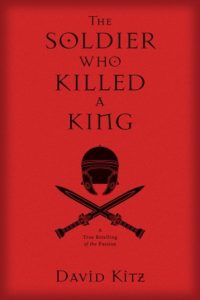The dramatist and minister talks about the challenges of retelling the Passion through fresh eyes.
As a Bible dramatist, author, and minister, David Kitz brings a unique perspective to his Christian fiction. His book The Soldier Who Killed a King: A True Retelling of the Passion (Kregel Publications) was inspired by his traveling one-man show that demonstrates how the Resurrection changed history—one life at a time. In this interview, David explains the background of the original play, how he has now recounted these events in three different forms of media, and how his dramatic flair gives him an advantage writing fiction…
Your book The Soldier Who Killed a King was inspired by your one-man play The Centurion’s Report. What inspired you to write and perform the original play?
 Twenty-five years ago, I was the pastor of a small church. For my Christmas message, I had dressed in shepherd’s garb and told the story of Jesus’ birth from a shepherd’s perspective. That message was well received, so I thought I would try something similar for Easter.
Twenty-five years ago, I was the pastor of a small church. For my Christmas message, I had dressed in shepherd’s garb and told the story of Jesus’ birth from a shepherd’s perspective. That message was well received, so I thought I would try something similar for Easter.
But from whose perspective should I tell the Easter story? After reading through the four Gospel accounts, I concluded the most compelling perspective was that of the Roman centurion, who after Jesus took his last breath declared, “Surely he was the Son of God!” See Matthew 27:54. A few hours at the cross led this Gentile unbeliever to make the same declaration that Peter made after following Jesus for more than two years.
What does that tell us? It tells us that time is compressed at the cross. Our humanity is exposed at the cross. Christ’s deity is exposed there too. When those two things happen, change happens. Repentance happens. Redemption happens.
You’ve been performing that for years. Is this the kind of production where you set up somewhere for a theatrical run, or do you travel with it? Who do you perform it for? Can you tell our readers what it’s like to see the production?
Typically, I travel with this play. Most of my presentations are for local churches spanning the continent from Charleston, South Carolina, to Vancouver, Canada.
Occasionally, churches in a community have come together and rented an arena or community center to host a presentation. I have also presented The Centurion’s Report for Christian high schools and military chaplaincies.
What led you to write The Soldier Who Killed a King as a novel?
 In those early days, my confidence grew as I was invited to present my drama at various churches across the country. At the same time another thought was brewing. I came to realize that this four-act, one-man play could form the base for a Passion of Christ novel. In what little spare time I had, I began working on the novel. It took six years to complete.
In those early days, my confidence grew as I was invited to present my drama at various churches across the country. At the same time another thought was brewing. I came to realize that this four-act, one-man play could form the base for a Passion of Christ novel. In what little spare time I had, I began working on the novel. It took six years to complete.
So, how much is the book an adaptation of the play, as opposed to a different work based on the same events?
To a limited extent the book is an adaptation of the play. The play has four acts, while the book has forty chapters.
Chapter one is drawn directly from act one of the play and it covers Jesus’ Palm Sunday entry into Jerusalem. Act two portrays Jesus cleansing the temple and healing the lame and the blind. This corresponds to chapter six in the book. Act three deals with the trial and crucifixion of Jesus, which covers chapters 23 through 31. The final act details the guarding of the tomb and the resurrection, and roughly it covers Chapters 34, 39, and 40.
The point that needs to be made here is that you can do so much more with a 285-page book versus an hour-long play. The book format allows you to introduce other characters and events as the week progresses. It allows you to go behind the scenes and examine the home life of the centurion, and the culture and political intrigue of that time. In brief, the novel provides a richer, fuller experience.
Click through to find out about the challenges of sharing one story in THREE different forms of media…


